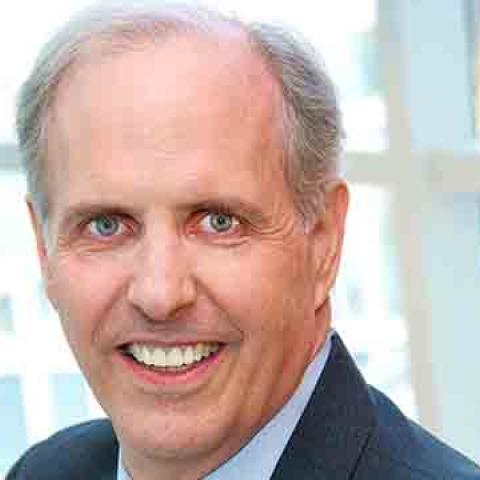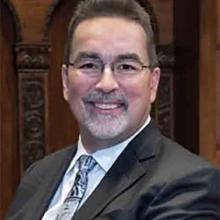At Case Western Reserve University, faculty fuel discovery, inspire students and advance knowledge across disciplines. Through their teaching, research and mentorship, they shape not only their fields but also the next generation of scholars and innovators.
Each year, the university recognizes select members of its faculty with the title of Distinguished University Professor—its highest honor—for careers marked by extraordinary scholarly achievement and lasting institutional impact.
This year, two remarkable members of the CWRU faculty have received that distinction: Jonathan L. Haines and Roger H. French. Their pioneering work—in genomics and materials data science, respectively—has left a lasting mark on science, education and society. Learn more about their accomplishments below.
Jonathan L. Haines
Jonathan L. Haines has built a career on asking bold questions—and designing the tools needed to answer them.
For more than four decades, his groundbreaking discoveries have advanced our understanding of complex human diseases, while his leadership and mentorship have helped shape the future of genetic medicine. In recognition of his extraordinary contributions to science and scholarship, Case Western Reserve has named Haines a Distinguished University Professor—its highest faculty honor.
Haines is the Mary W. Sheldon, MD, Professor of Genomic Sciences and chair of the Department of Population and Quantitative Health Sciences at the School of Medicine. He also serves as founding director of the Cleveland Institute for Computational Biology (CICB), a hub for biomedical innovation that integrates genetics, epidemiology and clinical research to solve major public health challenges.
From the earliest days of the genomic era, Haines has been a force in the field. In the late 1980s and early ’90s, he helped identify genetic variants involved in Huntington’s disease, tuberous sclerosis, and neurofibromatosis—work that clarified how different mutations can cause the same condition, a concept known as locus heterogeneity.
In 1993, Haines and colleagues made a discovery that transformed Alzheimer’s research: the common e4 variant of the APOE gene significantly increases the risk of late-onset Alzheimer’s disease. The following year, they showed that the e2 variant offers protection. Together, the findings revolutionized the study of complex genetic traits.
He has continued to drive the field forward, co-leading what was then the largest genome-wide association study of Alzheimer’s, with data from more than 94,000 individuals. His research has also led to key discoveries in age-related macular degeneration and multiple sclerosis, providing crucial insights for treatment and prevention.
Under Haines’ leadership, the CICB has developed the Safely Held Electronic Data (SHED) system to harness electronic health records, big data, and AI. SHED now supports more than 35 projects across the university, helping position CWRU as a national leader in translational informatics and research infrastructure.
“Dr. Haines is a pioneer in the field of human and medical genetics,” wrote Stan Gerson, dean of the School of Medicine, in nominating Haines for the honor. “He entered the field at a time when the tools for genetic analysis were nascent, and the human genome was largely uncharted territory. Undeterred by these challenges, his groundbreaking research rapidly led to significant discoveries in neuromuscular, neurodegenerative, and ocular diseases.”
Equally devoted to mentorship and education, Haines has guided more than 60 graduate students and postdoctoral fellows and launched new graduate programs in public health and data science. His influence also extends well beyond campus: he is a fellow of the American Association for the Advancement of Science, has served on numerous national advisory boards, and is author or co-author of more than 730 scientific publications cited over 118,000 times.
“Receiving this honor is deeply meaningful to me,” said Haines. “Not just as a personal milestone, but as recognition of the incredible teams and collaborators I’ve had the privilege to lead and learn from. Building knowledge is a collective pursuit—and I’ve always believed in creating spaces where others can thrive.”
Roger French
Roger H. French has spent his career connecting disciplines—and people—through data.
An internationally recognized scientist, educator and innovator, French is known for transforming how researchers understand the lifecycle of materials. This spring, Case Western Reserve recognized his profound impact by naming him a Distinguished University Professor.
French, the Kyocera Professor of Ceramics in the Department of Materials Science and Engineering, joined the Case School of Engineering faculty in 2010 following a distinguished quarter-century career at DuPont. His decision was driven by a desire to explore the emerging frontiers of big data, distributed computing, and lifetime science.
“The university has been committed to high performance computing for decades, having been a significant player in Arpanet in the 1970s,” said French. “When I was contemplating leaving central research at DuPont for academe, Case Western Reserve was clearly a desirable destination.”
In the 15 years since, he has become a leading voice in materials data science, helping pioneer what is now known as “Data-Centric AI/ML”—a methodology that unites artificial intelligence and materials science to solve real-world challenges.
“In his work … French set an entirely new direction for the department, school, university, and beyond, with enormous potential for timely research and student education,” wrote Venkataramanan “Ragu” Balakrishnan, the outgoing Charles H. Phipps Dean of Case School of Engineering, in nominating French. “In his area of education and research, he is a leader with international visibility.”
That leadership—and his forward-looking approach to integrating data science with materials research—took tangible form in the Solar Durability and Lifetime Extension (SDLE) Research Center, which French launched in 2011. The SDLE Research Center has grown into a nationally recognized research hub, supporting more than 300 investigators and enabling groundbreaking research in predictive lifetime science. Through SDLE and affiliated projects, French has helped secure more than $42 million in research funding.
He is also a builder of academic infrastructure. In 2013, French worked with colleagues across the university to establish CWRU’s undergraduate minor in applied data science, available across all eight schools. It was later joined by a graduate certificate program, and together they have reached more than 1,100 students since 2015.
French’s teaching extends to partner institutions including University of Central Florida, University of Pittsburgh, The University of Texas Rio Grande Valley and soon Tuskegee University, expanding access to data science education nationwide. He has mentored dozens of undergraduate and graduate students at CWRU and created paid summer research and outreach opportunities for high school students across Greater Cleveland.
His innovations also extend into the private sector. French co-founded Edifice Analytics, a startup built around his patented virtual energy audit technology—translating decades of data analytics into tools for sustainable building management.
“[Over his career], Professor French has reshaped the way the scientific community approaches material reliability,” wrote Dierk Raabe, managing director of the Max Planck Institute for Sustainable Materials. “His innovative applications of AI provide actionable insights for industries ranging from energy to healthcare—an achievement that is highly impressive and rarely seen in this breadth.”
Reflecting on the honor, French said the recognition felt personal—but not individual.
“The university has been supportive of my initiatives in applied data science,” he said. “I’m proud to work with many different people and departments across the university as we train data-enabled students to prosper in whatever fields they pursue.”



